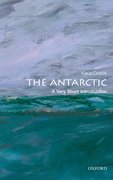The Sunday Times Oxford Literary Festival 2013 is in full swing, welcoming thinkers and writers from across the globe to our wonderful city of Oxford. We’re delighted to have over thirty Oxford University Press authors participating in the Festival this year! OUPblog will be bringing you a selection of blog posts from these authors so that even if you can’t join us in Oxford this year, you won’t miss out on all the action. Don’t forget you can also follow @oxfordlitfest and check the event schedule here.Klaus Dodds will be appearing at the Oxford Literary Festival on Thursday 21 March 2013 at 1:15 p.m. to provide a very short introduction to the Antarctic. The event is free to attend.
By Klaus Dodds
When I wrote The Antarctic: A Very Short Introduction, I wanted the book to be something of a provocation. The aim, in short, was to highlight things that often get neglected in the midst of stories and images of past and present explorers, melting ice caps, tourists and the penguin. The reality is rather more disturbing.
The first inconvenient truth is that the Antarctic is a deeply disputed space. It is not a place where everyone co-operates straight forwardly just because there is no indigenous human population. We might be worried about the future stability of the polar ice sheet, but in the meantime a host of countries are busy cementing their sovereign claims. Britain has renamed a vast area of British Antarctic Territory Queen Elizabeth Land. The Chilean president visited the Antarctic in January 2013 to inaugurate a new research station to be manned by the Chilean air force. And Argentina believes that any resources lying off the Antarctic Peninsula belong to it and no one else. Alongside those three states, four other countries, Australia, France, New Zealand and Norway also believe that they enjoy sovereignty over large sways of the polar continent and surrounding ocean. The United States and Russia reserve a right to make a claim in the future while other members of the international community believe that the Antarctic is a global common.
The second inconvenient truth is that the parties to what is called the Antarctic Treaty System are struggling to manage resource exploitation. Fishing in the Southern Ocean is worth millions of pounds a year. Fish such as the Patagonian Toothfish are highly lucrative and the Commission for the Conservation on Antarctic Marine Living Resources (CCAMLR) struggles to get agreement on how best to manage such a fishery. And even then that does not even begin to address the problem of illegal, unregulated and unreported (IUU) fishing in the Southern Ocean. Whaling, although addressed by the International Whaling Commission, is also a fractious affair. Australia and Japan are at loggerheads over whaling in the Southern Ocean, and there is currently a case pending in the International Court of Justice.
The third inconvenient truth is that some countries are perfectly prepared to investigate the Antarctic for its mineral potential. The Antarctic Treaty parties proudly announced to the world that the Protocol on Environmental Protection would ban mining in the Antarctic. The Protocol entered into force in 1998, and this was considered to be instrumental in reducing diplomatic and political pressure on the ATS from environmental organizations and members of the Global South who feared that an elite group of nations might exploit the continent for their own self-interest. In 2012, the Russian delegation submitted a paper to the 35th Antarctic Treaty Consultative Meeting, which blithely mentioned that their scientists were interested in the ‘Determination of structure, geological evolution and potential mineral resources of the Antarctic lithosphere’.
The fourth inconvenient truth is that the Antarctic is heavily commercialized. As with the Arctic, the Antarctic supports a tourist industry involving multiple ships and planes transporting at its peak some 40,000 per year. The tourist industry is an important source of revenue for so-called gateway ports such as Christchurch, Punta Arenas and Stanley in the Falkland Islands. There have been accidents and emergencies in the Antarctic region caused in part because of poor sea conditions but another contributory factor might be the pressure on tour operators to go to ever more remoter parts in order to generate an ‘authentic’ expeditionary experience. A number of countries such as Chile are trying to cash in on this trend and establish hostels and other forms of accommodation to cater for wilderness holidays. It also helps to cement sovereign claims.
The fifth and final inconvenient truth is that there is a growing anxiety about the role of China in Antarctica. While everyone associated with the Antarctic Treaty System is eager to emphasize the consensual nature of decision making and scientific co-operation in the field, there is a worry that a new phalanx of countries led by China, and including Brazil, India and Korea, is going to challenge the political and scientific hegemony previously enjoyed by an alliance involving the United States, Europe and countries such as Australia and New Zealand. In Australia, the media has been full of stories about China’s growing polar footprint – bases, networks and place names. The Antarctic map is being changed as Chinese, Indian and Korean place names lie adjacent to Euro-American naming traditions.
So by all means enjoy the nature programs and continue to revel in the exploits of past explorers and their contemporary avatars but be aware that the geopolitics of the Antarctic is lively. This icy wilderness is being claimed, coveted, exploited by a growing numbers of nations.
Klaus Dodds is Professor of Geopolitics at Royal Holloway, University of London. He is author of a number of books including Geopolitics: A Very Short Introduction (2007) and The Antarctic: A Very Short Introduction (2012).
Subscribe to the OUPblog via email or RSS.
Subscribe to only VSI articles on the OUPblog via email or RSS.




[…] shipping revolution in the warming Arctic. At the Oxford University Press blog, on the other hand, Klaus Dodds laid out five “inconvenient truths” about the Antarctic. Contrary to the popular perception of a pristinely protected penguin reservation, he argued, the […]
[…] other than for adjunctive scientific purposes, more than a half dozen countries squabble over territorial claims – the UK, Chile, Argentina, Australia, New Zealand, France and Norway. The US supposedly […]